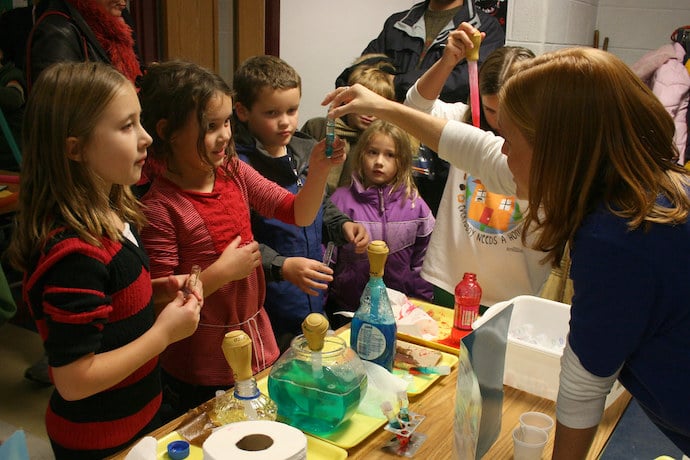Over the summer, as I revisited my 6th grade Computer Science curriculum, I took a few minutes to think about this year’s group of incoming students. Similar to the Beloit College Mindset List, I thought about these eleven year olds, their life experiences, and their futures. Students in this class most likely were born in 2008, which means they have always lived in a world where iPhones, Bitcoin, and Spotify all have existed.
As well, if all goes according to plan, these students will graduate college and enter the workforce in the Spring of 2030. Getting a sense of the world they will inherit eleven years from now is a tough task to accomplish, although one thing is certain. This generation will face extreme challenges in their lifetimes. However, some educators are rethinking how the educational system is preparing these 6th graders to meet this future.
The age-old model of presenting content, mastering knowledge, and applying concepts has been the pillar that nearly all modern education has been constructed. It has helped one generation disseminate the worlds of art, science, technology, and humanities to the next generation through a progressive cycle of growth. However, the stark truth is that world of lectures and direct instruction that has served many generations does little to equip students facing uncertain challenges.
My incoming 6th-grade students will face a drastically different world in 2030 than the one in which my fellow teachers and I graduated. While teachers of many eras could make this claim, the immense challenges that this generation will have to solve in their lifetimes dwarf many of the past. From climate change to the proliferation of plastic to the acidification of the ocean, the young people of this world will most likely be inheriting large, existential problems that will require them to think critically and solve large, thorny problems.
So, how do teachers prepare tomorrow’s scientists, engineers, poets, and leaders for a future with uncertain challenges? One idea that is gaining traction is the refocusing of curricula on the process of solving open-ended problems. While it is certainly not a new approach, Problem-Based Learning (PBL) is a student-centered model that restructures the normal rhythm of a classroom.
Students are given large, real-world problems to solve and through the process of finding a solution, they learn content alongside devising solutions. Rather than acquiring content solely from lectures, books, or apps, students create their own understanding by encountering problems and learning how to solve them. Working in teams with a common goal, they pool knowledge and understanding while repeating the process as many times as necessary. This approach teaches students iterative processes, decomposition, data processing, and resourcefulness among other skills.
One proponent of this modern style of education was the philosopher and educator John Dewey. A philosophy professor turned educator, Dewey founded the University of Chicago Laboratory School in 1896 and shaped a whole generation of teachers at Columbia Teachers College. The quintessential progressive, Dewey was a vocal proponent of first-hand experience in education, and he believed the road to understanding should be anything but smooth.
In his masterwork How We Think (1910), Dewey defined the concept of Reflective Inquiry where the experience of problem solving plays a pivotal role. He believed that “demand for the solution of a perplexity is the steadying and guiding factor in the entire process of reflection.” Through the process of encountering and solving problems, students construct their own understanding and gain a more robust, high-definition knowledge of a subject.
In his books, Dewey compared the role of the learner to that of an explorer mapping an unknown territory. As my young students begin a new year, they have a lot in common with Dewey’s explorer. Similar to looking at a blank spot on a map, these students will face future challenges that are difficult to grasp at the moment. Reorienting subjects as diverse as Science and the Humanities towards problem solving could help students think creatively and be resourceful. However, this change is not an easy leap for many teachers to take.
The positive news is that organizations such as Harvard University’s Project Zero, the Buck Institute’s PBLWorks and others are engaging teachers world-wide in this venture. Hopefully, many more take on the challenge in the near-future. It is one of the best ways we can equip our explorers and give these students the cognitive tools they will need in the 2030s.
Learn More
21st Century learning strategies
What does Problem-based learning look like?
Ideas for project-based learning
https://teachthought.com/project-based-learning/a-better-list-of-ideas-for-project-based-learning/
John Dewey biography
https://www.britannica.com/biography/John-Dewey
Harvard project-based learning
http://www.pz.harvard.edu/who-we-are/about
PBL
Parent resources for project-based learning
https://www.edutopia.org/project-based-learning-parent-resources
Project-based STEM activities
https://www.wabisabilearning.com/blog/36-stem-project-based-learning-activities
Inspiring project-based learning for kids
Inspiring project-based learning for kids
https://www.gettingsmart.com/2017/09/little-kids-big-ideas-inspiring-project-based-learning/
Project-based learning: science
https://www.thetechedvocate.org/14-project-based-learning-activities-science-classroom/

